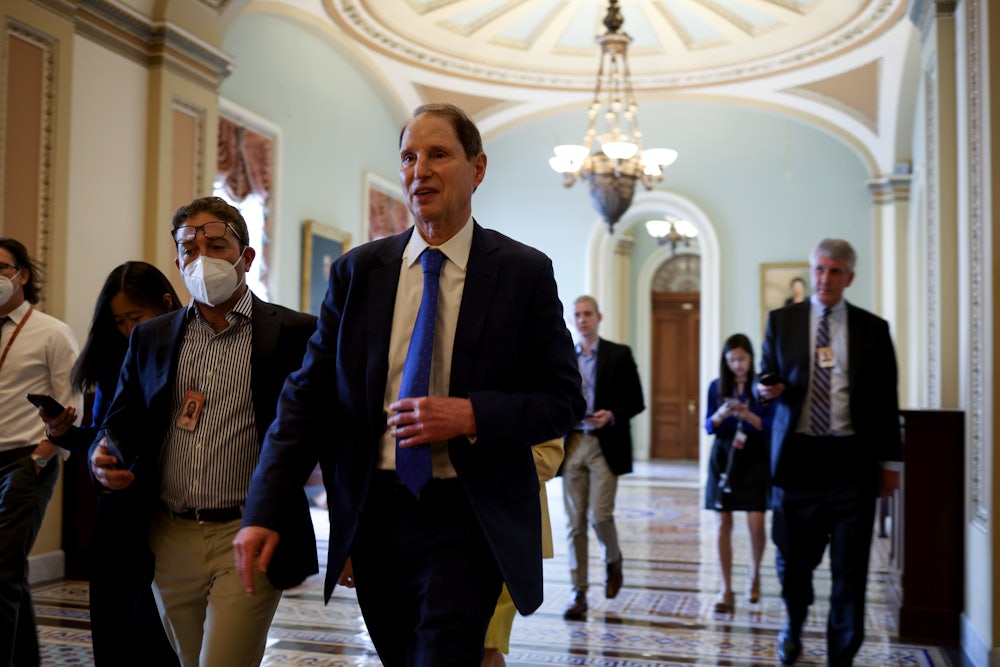Of all the many provisions jammed into the 2,700-page bipartisan infrastructure bill that’s teetering ever closer to passage, an unlikely one has come to dominate the news in recent days: cryptocurrency taxes. A brief item nestled in the bill would aim to raise about $28 billion over 10 years, mostly by extending financial reporting requirements for digital assets to brokers and trades of more than $10,000. The crypto tax quickly became the subject of two dueling proposed amendments, as well as intensive lobbying that has ranged from the fetid swamps of Twitter to the halls of the Treasury Department. (Raising $28 billion is a potential step toward closing the tax gap, but it’s also only a few billion more than the $25 billion with which a Senate panel recently decided to pad the Pentagon budget.)
The half-dozen senators behind the opposing amendments eventually settled their differences—with Ron Wyden a notable holdout—but any last-minute amendments, while of potential concern to millionaire crypto holders, may not be of major consequence as the infrastructure bill is shepherded further along its tortured journey to Biden’s desk. What’s more important is that the very idea of taxing cryptocurrency profits has already catalyzed a nascent political movement in the crypto community and among its well-heeled corporate backers. An industry built on fomenting a libertarian exit from mainstream politics and finance has found, not for the first time, that both are difficult to escape.
The cryptocurrency industry was at first surprised by the proposed legislation, Politico reported, “but it fought back with a vengeance, showing that startup digital trading platforms and other firms could rally a small army of recently requisitioned trade associations, lobbyists and public relations experts to put up a real defense.” The complaints varied, but the basic disagreement boiled down to who or what counted as a “broker” and who consequently had reporting requirements to the IRS. There were also differences in the kinds of “mining” that the respective amendments encouraged. The eventual compromise language clarified, and in practice likely narrowed, the definition of a broker.
If you wanted to get a sense of how Bitcoiners and other committed crypto partisans were reacting to all this, you could simply tune in to Twitter, where complaints about demanding regulations and out-of-touch politicians abounded. Michael Saylor, the tech mogul who likes to express his crypto fanaticism by tweeting historical platitudes as if they were about Bitcoin, quoted Founding Father John Jay: “No power on earth has a right to take our property from us without our consent.”
On the political lobbying side, Ron Hammond, director of government relations at the Blockchain Association, practically offered a play-by-play of semi-clandestine communications between industry officials, like himself, and members of Congress and the Biden administration. On Monday morning, with about a day left for any amendment to find its way into the bill, Hammond tweeted: “Behind the scenes we are actively having negotiations on a path forward but the general politics of the infrastructure bill are taking over as Senators feel urgency to move on and go. We need to keep up the public pressure.”
With the tax provisions remaining in place and any possible amendments in a holding pattern, that pressure seemed to have yielded limited results beyond some favorable media coverage and busy phone lines in senators’ offices. On the other hand, something notable did happen: A $28 billion tax measure targeting an industry rife with scams, subterfuge, and tax evasion caused critics to hold up, at least for a time, a trillion-dollar piece of legislation—and politicians took notice. As Hammond wrote on Twitter: “The fact the crypto industry has forced a delay on arguably the largest policy priority of the Administration (outside of COVID) is a testament to the strong lobbying forces in play. We are working together and to say we haven’t slept much in the past week is an understatement.”
Still, this is largely a public awareness victory—if a victory at all—for a cryptocurrency industry that, even as prices rise, continues to be under siege from all sides. The crypto community can flex its meme-driven lobbying power in boastful tweets, but can it actually win any victories? It’s hard to keep track of the proliferating investigations, both in the United States and abroad, into cryptocurrency exchanges like Binance, rogue traders, money launderers, market manipulators, and stablecoins—coins pegged to a particular value that help provide liquidity to crypto markets—like Tether. Hardly a day goes by without a high-ranking official, such as Securities and Exchange Commission Chairman Gary Gensler or Treasury Secretary Janet Yellen, warning of dangerous market volatility, especially on the stablecoin issue, which a recent Federal Reserve paper compared to the “wildcat banking” of the nineteenth century, when private entities issued their own currencies.
Crypto advocates do have one point in their favor: This entire affair has seemed rushed and haphazard, in the grand tradition of American policymaking, which only contributes to a sense of fractured decision-making by officials who may not know what they’re doing. “This is no way to make policy,” Neeraj Agrawal, director of communications at Coin Center, told CNN. “There’s decisions being made that will massively influence how cryptocurrency develops in America, but it’s being done as a last-minute addition to a must pass infrastructure bill.” Even if you think cryptocurrencies are everything their critics accuse them of, this is a clumsy way to make policy for a crypto industry that has an approximately $1.86 trillion market capitalization, according to CoinMarketCap (which is owned by Binance, the aforementioned cryptocurrency exchange currently subject to investigations in numerous national jurisdictions).
There has to be a better way, but it is not one defined by backdoor lobbying or Jack Dorsey, the billionaire Bitcoin fanatic who happens to serve as CEO of Twitter and Square, tweeting policy suggestions to senators. Some legislative and regulatory actions are needed to bring a shadowy financial system into the light and to create enforceable rules for markets currently defined by speculation, manipulation, and manic volatility. But it can’t be done piecemeal. As a recent fact sheet from the Open Markets Institute explained: “Should policymakers fail to give the Treasury Department the proper tools to ensure tax compliance across all crypto market actors, it risks creating a two-tiered system: one that furnishes tax reporting, and one that operates without tax reporting obligations. This could create easily accessible pathways for bad actors to avoid reporting—and a race to the bottom.”
It’s possible that we’re already at the bottom, with a shadow crypto market and decentralized finance economy almost totally beyond public view, much less governmental regulation. Billions of dollars are being risked—too much of it by everyday retail traders betting the family nest egg to make a little extra short-term money—in what amounts to a bubble of worthless, energy-intensive cryptocurrencies and baroque, unregulated financial products. A spate of regulatory measures, taxes, and federal investigations are long overdue. The industry’s lobbyists might be right: Holding up the infrastructure bill does signal something important about crypto’s place in the market. But it’s a message that increasingly sounds like a warning.








